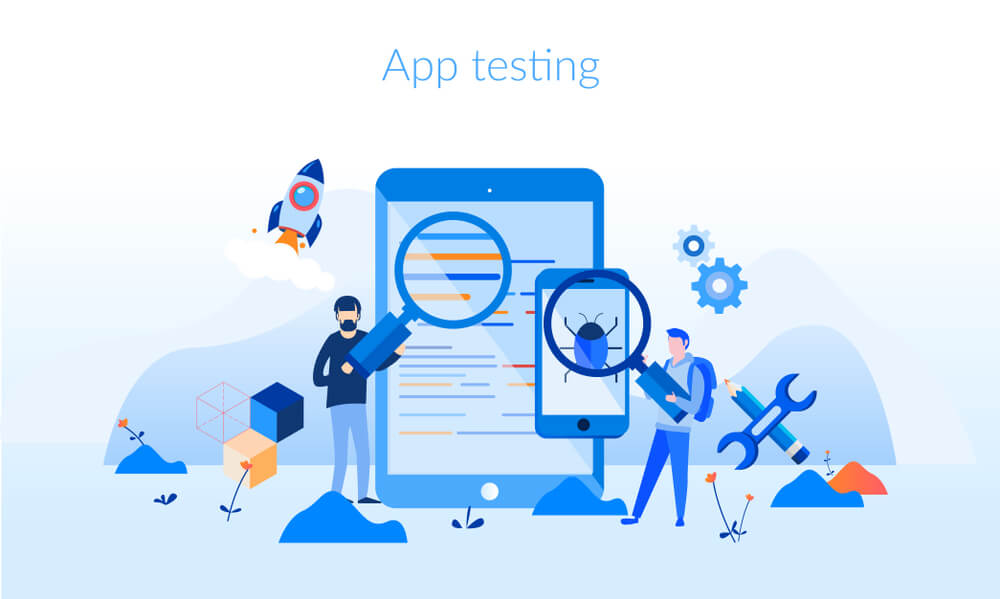
They say in the 21st century, data is the new oil. With the advent of the internet and allied technologies, doing the most basic things has changed radically. As smartphones and the internet are becoming cheaper and cheaper, every business is trying to attract and retain customers via mobile apps. The demand for mobile app testing services is, therefore at an all-time high. These businesses need the help of testing services to make their app a success. Thousands of apps are flooding the app stores daily. Sadly, most of them remain unnoticed.
One of the main reasons for this happening is the lack of awareness about the need for mobile app testing. Let’s see what mobile app testing is in detail.
Mobile app testing consists of the following elements:
- Performance Testing
- Interrupt Testing
- Installation Testing
- Recover-ability Testing
- Functional Testing
- Memory Leakage Testing
- Usability testing
- Security testing
- Compatibility Testing
Now let’s learn more about each of these in greater detail. We’ll also learn how it differs from desktop app testing.
1) Performance Testing
-
In performance testing, a tester addresses multiple challenges such as the draining of battery due to heavy battery usage, bandwidth problems (switching from 3G to 4G/ Wi-Fi, change in the network,etc.), difficulties while transferring heavy files because of low memory, etc. Therefore, the purpose of performance testing is to understand the performance of an app under different conditions and users.
- The idea of performance testing of desktops is irrelevant since it is assumed to have only one user.
- In this type of testing, individual functions such as Use Case, configuration, troubleshooting are tested.
2) Interrupt Testing
- We face many interruptions while using a mobile app. Some of these are receiving SMS, incoming calls, issues while connecting external devices, inserting power cable when the app is running, etc.
- To make sure that your app can withstand all these interruptions, a tester is supposed to perform interrupt testing in mobile devices as well as desktops.
3) Installation Testing
- It’s important to check the consistency of your app during installing and uninstalling processes.
- It’s a well-known fact that frequently crashing apps during these processes do not survive in the market.
- Installation testing checks whether the software is compatible with the desktop/mobile and whether it affects the navigation or the flow of other apps.
4) Recovery-ability Testing
- In this type of testing, crash recovery, interruptions during transactions are tested.
- Recovery ability testing mainly checks how an app works on transactions when there is an app failure, and also analyses whether the system (mobile/desktop) recovers the data after suspended connections.
5) Functional Testing
- The purpose of functional testing is to determine whether an app is functioning as intended.
- Functional testing is a very complex, exhaustive, and lengthy process. Therefore, it’s only wise to do it automatically, instead of manually.
- In the case of desktops, it’s a type of black-box testing which aims at checking whether system function is as originally intended and is user friendly.
6) Memory Leakage Testing
- The next test is the memory leakage test. This is performed to ensure that your app is utilizing optimized memory on different mobile devices.
- When compared to computer systems, the inbuilt memory of a mobile device is very low. Most of the OS environments shut applications that are consuming too much memory.
- By performing mobile leakage testing, we ensure that an app does not slow down mobile devices.
7) Usability testing
- The success of any app depends, inter alia, on its flexibility to use. A good app should be able to provide a greatuser experience. This is where usability testing comes in.
- Usability testing in desktop differs from mobile app testing as it tests distinctive features like configuration, customization, high personalization, user diversity, etc.
8) Security testing
- This is the most important type of testing. No user will ever use an app that has a lax data protection system.
- Security testing helps you in giving assurance to your customers that your app is free from security threats. Understandably, desktop testing demands more security concerning its access, along with data protection.
9) Compatibility Testing
- Compatibility Testing is performed on mobile phones to know how an app works on different devices.
- There are several devices with different screen size, resolution, hardware and software functionality, versions, etc. which make compatibility testing important.
- Compatibility testing determines whether the user interface of the application is as per the desired screen size, so no text is partially inaccessible or invisible.
- Compatibility testing for desktop apps aims at checking whether desktop apps are compatible with different platforms such as Mac OS, Windows, Linux, etc., report defects, and fixing them.
Conclusion
We live in a world where one person with a smartphone can get more done than many people could in the last century. Organizations, therefore, are keen on developing their apps to get things done quickly and efficiently. Mobile apps also help them scale up, reach almost any number of people.
An app working exactly as intended may make a huge impact on a company’s future. It is therefore imperative to thoroughly test an app before it’s launched.Even though new devices come up every day, the fundamentals of testing for both mobile and desktop remain the same. Yet, mobile application testing is more difficult than desktop software testing due to more variables.
How VTEST can help?
The need for mobile app testing is increasing day-by-day and it is important to have a strong backup company to test the apps. VTEST is a strong option. After we’re done with your app, we promise your app will be ready for the market. We’ve got you covered.
VTEST it!